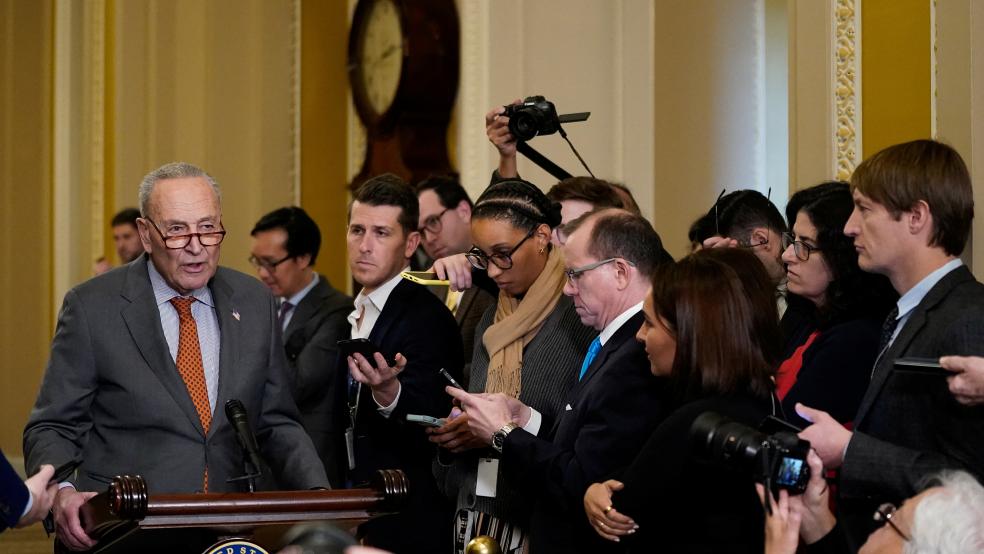Senate leaders said Tuesday that negotiators have made progress toward a national security supplemental spending bill including aid for Ukraine and border policy changes, but they acknowledged that the two sides have more work to do, meaning that a vote won’t happen until January at the earliest.
“I think it’s pretty safe to say that we’ve made some significant progress, but we obviously aren’t there,” Senate Minority Leader Mitch McConnell said Tuesday.
McConnell called the supplemental package “extremely important” and said he thinks the country needs the national security deal because “this is the most dangerous time since the fall of the Berlin Wall.” But with no deal in sight yet, the Senate was preparing to begin its holiday recess after a few final votes, including a temporary reauthorization of the Federal Aviation Administration and military nominations held up by Republican Sen. Tommy Tuberville as part of his protest over a Pentagon policy on abortion-related travel.
Some lawmakers were already in holiday mode; just 61 of 100 senators voted Monday night on the confirmation of former Maryland Gov. Martin O’Malley as Social Security commissioner. O’Malley was confirmed by a 50-11 margin.
Senate Majority Leader Chuck Schumer last week kept lawmakers in town and said they’d be voting on a security-funding package this week, but Senate Republicans have been insistent that there was no chance of a deal getting done before the end of the year given the issues that remained unresolved and the legislative text that had yet to be written. Schumer acknowledged as much on Tuesday. “We know it’s going to take more time,” he told reporters after a weekly Democratic lunch, “but I am significantly more optimistic today than I was Thursday when we left based on the negotiations that have occurred all weekend.”
The talks have been the subject of criticism and questions from members of both parties, who are worried that their representatives might privately agree to concessions they find problematic.
“There’s a reason why Congress hasn’t passed major immigration or border reform in 40 years. This is tough to come to a compromise and it’s just as tough to write to make sure that you get the ideas down on paper in a way that makes sure that the policy is implemented correctly,” said Sen. Chris Murphy, the lead Senate Democratic negotiator, adding, “Momentum is heading in the right direction, and I think that will continue over the course of this week.”
Murphy said he would take a day and a half off for Christmas but would otherwise keep the talks going, adding that negotiators are “closer than ever before to an agreement.”
Government funding deadline looms: Lawmakers will face two deadlines to prevent partial government shutdowns early next year, one on January 19 and the other on February 2. And Congress isn’t due back until the week of January 8, leaving precious little time for dealmaking. Senate Appropriations Chair Patty Murray, a Democrat from Washington, urged Republicans to abide by the debt-ceiling deal struck by former House Speaker Kevin McCarthy months before his ouster. “You don’t get to negotiate how much of your word you’re going to keep,” she said Tuesday.
McConnell on Tuesday took a jab at leaders on the other side, telling reporters that the Senate wasn’t nearly as productive as it could have been and that more progress could have been made on annual appropriations bills. But when asked if the House should stick to the debt-ceiling deal on spending levels, he demurred. “I don’t give the speaker public advice about how to handle things,” he said before adding that a spending deal is important to avoid a full-year continuing resolution, which under the debt-ceiling deal would come with automatic 1% cuts across the board.
“A CR is simply unacceptable for a year. It’s devastating, particularly for defense, and we’ve got all of these wars going on. So we need to reach an agreement on the top line [spending level] and get about getting an outcome as soon as possible.”
The bottom line: Tomorrow will be the last day the Senate is in session, so wait ‘til next year! It’s shaping up to be a doozy!





